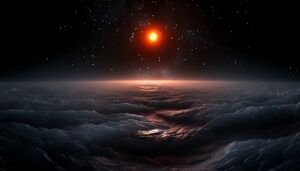
| Type: | M4 V Red Dwarf |
| Radius: | 2.69 x 105 km (0.39 of Sol) |
| Mass: | 5.39 x 1029 kg (0.27 of Sol) |
| Temperature: | 2700 K |
| Luminosity: | 2.74 x 1024 W (0.01 of Sol) |
| Ecosphere: | Between 0.09 and 0.12 AU |
| Location: | Xi Ursae Sector |
The Nova Ursae system is characterized by a dim M4 V red dwarf star emitting a feeble 0.01% of Sol's luminosity. The system is rich in asteroid fields and diffuse clouds of hydrogen, helium, argon, and radium gas, creating a navigational hazard, particularly in the orbit of the lone planet, Aethel.
Aethel
| Class: | O |
| Distance: | 1.58 x 107 km (0.11 AU) |
| Period: | 240 Days |
| Radius: | 10,934.9 km (1.72 x Earth) |
| Gravity: | 1.14 G |
Aethel, a Class O planet residing at the fringes of its star system's habitable zone, is a world dominated by water and ice. Its hydrosphere, composed of 92% water, reveals a landscape where 71% of the surface is cloaked in ice. This frigid environment results from the planet's average temperature of -17°C, although a temperate equatorial belt offers a respite from the pervasive chill. Here, temperatures average a more hospitable 20°C, while the polar regions remain locked in a perpetual deep freeze, rarely exceeding -45°C. A thin, reducing atmosphere, primarily oxygen-nitrogen, blankets the planet, varying in thickness from 6 to 7 kilometers and maintaining an average pressure of 90.69 kPa (0.89 atmospheres). Despite the harsh conditions, life persists on Aethel in the form of prokaryotic microbes, inhabiting this icy, ocean world at the edge of habitability.
Unique Properties
- Tidal Resonance
- Extreme tidal variations reshape the icy landscape.
- Cryovolcanic Plumes
- Eruptions from cryovolcanoes create transient atmospheric events.
- Piezoelectrically-Active Ice
- Ice deformation generates heat, contributing to liquid water pockets.